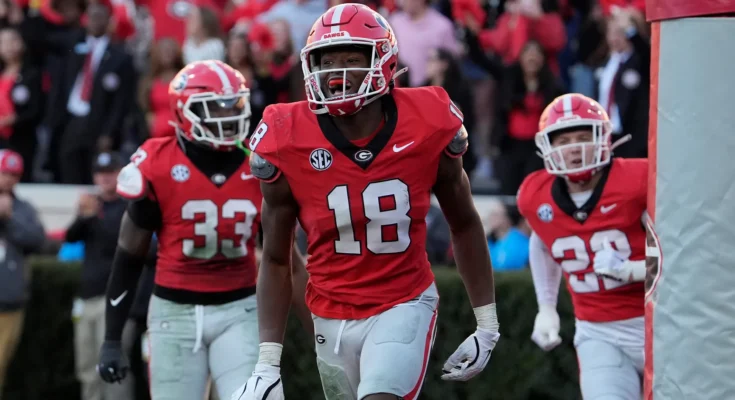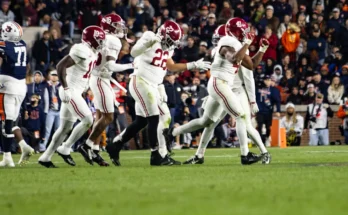David Pollack Being Snubbed from the All-Time AP All-American Teams Raises Questions About Recognition of True College Football Legends Everywhere
David Pollack is one of the greatest defensive players in the history of college football, and certainly one of the most decorated to ever wear the red and black for the Georgia Bulldogs. His dominance during his career in Athens from 2001 to 2004 was not just impressive—it was historic. Yet when the Associated Press recently released its All-Time All-American teams, celebrating the greatest players across the long and storied history of the sport, Pollack’s name was conspicuously absent. For Georgia fans, and for many who followed his career nationally, the snub feels not only surprising but borderline inexplicable. In order to understand why this decision has sparked so much debate, it is necessary to examine Pollack’s career, the broader context of All-American recognition, and the deeper meaning behind honoring college football’s true legends.
Pollack’s story is almost mythic. He was not a highly hyped five-star recruit when he entered Georgia, but he quickly emerged as a player who embodied relentless effort, consistency, and sheer production. From the very beginning, he made his presence felt. By the end of his collegiate career, he had become a three-time consensus All-American, something only a handful of players in history can claim. He was also awarded the Chuck Bednarik Award, the Lombardi Award, and the Ted Hendricks Award—trophies that are reserved for the absolute best defenders in the game. Pollack remains Georgia’s all-time leader in career sacks with 36, a record that has stood for decades despite the Bulldogs consistently producing NFL-caliber pass rushers since. When one stacks these accomplishments against those of other defensive greats who did make the AP All-Time list, it is difficult to argue that Pollack does not belong in the same conversation.
The essence of Pollack’s game was disruption. Off the edge, he wreaked havoc on quarterbacks and offensive linemen alike. His motor never stopped. He combined a relentless drive with underrated athleticism and technique, making him the kind of defender offensive coordinators had to account for on every snap. Beyond the numbers and the awards, Pollack had the kind of presence that defined Georgia’s defense during the early 2000s, helping lead the Bulldogs to an SEC championship in 2002 and establishing the program as one of the toughest in the country. To leave him out of an all-time team feels like a dismissal not only of his individual brilliance but of the role he played in elevating Georgia to national prominence during that era.
The Associated Press All-Time All-American teams are, of course, selective by design. With more than a century of college football to draw from, any such list is bound to generate controversy. However, it is the criteria—or lack thereof—that make Pollack’s absence particularly striking. If the measure is consistent dominance across multiple seasons, Pollack qualifies. If the measure is national recognition through awards, Pollack qualifies. If the measure is impact on a program and the sport at large, Pollack qualifies. And yet his name was omitted, leaving fans to question whether the selection committee simply overlooked him or whether they placed disproportionate weight on NFL careers, which should not be the point of a college award. Pollack’s NFL career was tragically cut short by a neck injury just as it was beginning to blossom, but that should have no bearing on his college legacy, which was fully established long before he ever set foot in an NFL stadium.
What makes the snub harder to swallow is the fact that other players with less decorated collegiate resumes were included. This is not to diminish the greatness of those who did make the teams, but rather to highlight the inconsistency in applying standards. Pollack’s résumé is bulletproof. Three-time All-Americans are exceedingly rare. Award winners of his caliber are even rarer. His sack numbers speak for themselves. For Georgia fans, the decision smacks of regional bias or perhaps a preference for more recent players who may be fresher in the collective memory of voters. But college football history should be evaluated holistically, and leaving out someone of Pollack’s stature undermines the credibility of the exercise.
It is also important to view Pollack’s career in the context of Georgia’s larger history. The Bulldogs have produced numerous legends, from Herschel Walker to Champ Bailey to Fran Tarkenton, and their representation on all-time lists is always a point of pride for fans. Walker, of course, is universally acknowledged as one of the greatest to ever play the game, and his inclusion is automatic. But Pollack belongs in that same echelon of Georgia icons who not only achieved individual greatness but also carried the program forward. His snub feels like a dismissal of Georgia’s defensive legacy, which has been one of the program’s cornerstones for decades. Without recognizing players like Pollack, the narrative around Georgia football risks being incomplete.
Beyond the numbers and accolades, Pollack’s story is also about character and inspiration. After his playing career ended prematurely due to injury, he transitioned into a successful broadcasting career with ESPN, where he became one of the most respected analysts in college football. His insights, enthusiasm, and authenticity made him a fan favorite. He was more than just an ex-player on television; he was a passionate advocate for the sport and a role model for perseverance. That post-playing career should not factor into an All-Time All-American team selection, but it does reinforce the idea that Pollack’s impact on college football extends far beyond the field. When you combine his legendary college career with his role as an ambassador for the sport, it is almost impossible to argue that his legacy is anything short of all-time caliber.
The debate over Pollack’s exclusion also touches on the larger question of what these lists are supposed to represent. Are they merely a collection of the biggest names and most famous players? Or are they meant to honor those who truly dominated the college game, regardless of professional outcomes? If it is the latter, then leaving Pollack out is indefensible. College football is filled with players whose NFL careers never matched their college dominance, but their place in history is secure because of what they did on Saturdays. Pollack belongs firmly in that category. His greatness should be measured by what he did in Athens, not by what might have been in Cincinnati had injuries not intervened.
For Georgia fans, the snub will likely serve as fuel. Pollack is already immortalized in Bulldog lore, and his absence from the AP All-Time teams does nothing to diminish his impact in Athens. If anything, it gives fans another rallying point to remind the wider college football world of what he accomplished. In the same way that Herschel Walker’s name instantly evokes dominance, Pollack’s should evoke memories of relentless pursuit, sacks in crucial moments, and a defensive leader who never took a play off. Lists may come and go, but the memories he created remain timeless.
It is worth noting that Pollack himself has always handled both success and adversity with humility. While fans may feel outraged on his behalf, he would likely respond with the same grace and perspective he has shown throughout his life. That, too, is part of his legacy. He represents not just excellence on the field but also character off of it, and that is what makes him one of the most beloved figures in Georgia football history. Whether or not the AP chooses to acknowledge him, his place among the all-time greats is secure in the hearts of those who watched him play and those who understand the game at its deepest levels.
Ultimately, David Pollack’s omission from the All-Time AP All-American teams says more about the flaws in the selection process than it does about his career. His résumé is unassailable. His impact is undeniable. His story is unforgettable. Recognition from the AP would have been fitting, but it is not necessary to validate what Georgia fans and college football historians already know: David Pollack is one of the greatest defensive players the college game has ever seen. The snub will fade with time, but Pollack’s legacy will not. He will forever be remembered as a Bulldog legend, a defensive force of nature, and an icon of college football whose greatness transcends lists and honors. In the end, no omission can erase the truth of his impact or the place he occupies in the pantheon of the sport.



